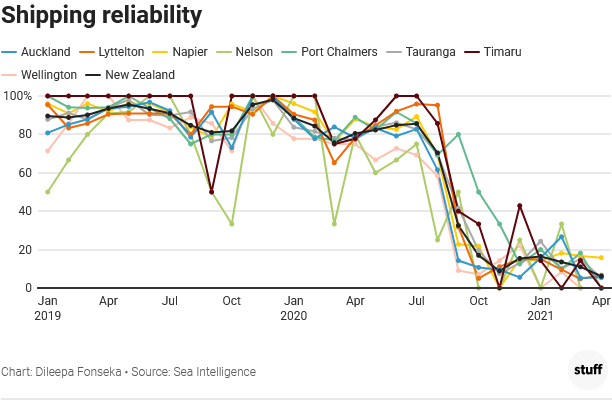In an amazing article in Stuff When will supply chain woes end? Dileepa Fonseka has written about the supply chain. We, like every country in the world, are suffering from a lack of investment in port infrastructure, coastal shipping, railways being underinvested, lack of drivers for trucks etc.

Transport Minister Michael Wood says the answer to the freight industry’s question may be a year to 18 months from now, but he also warns the world’s supply chains may never go back to the way they were before Covid-19.
”I will work with the ministry to continue to engage with freight companies and cargo owners to see where our Government can support market-led mitigations.”
Wood is expecting the Ministry of Transport to produce the first draft of the New Zealand Freight and Supply Chain Strategy by the end of next year.
Transport minister Michael Wood says supply chains may never get back to pre-Covid “normal”.
It will involve a plan for Government to invest in ports, rail, and roads for the next 15 to 30 years, with the idea of optimising the supply chain, and a plan for a sustainable coastal shipping sector (coastal shipping has traditionally been dominated by foreign shipping lines).
”The strategy will also be useful for businesses looking for clarity from Government to guide their own investment decisions.”
Recently analysts have observed a change in shipping prices, giving them cause for hope. The Drewry World Container index has seen a dip since Toft gave that speech, from over US$10,000 per container in September to over US$9100 in November.
My question would be why should it take so long to arrive at this plan? We were discussing most of these matters when I was on the NZTA board 12 years ago. The answers are known. It just requires a commitment to action.
The article went on:
This year’s disruptions have also been exacerbated by five major unpredictable international disruptions: the Ever Given blocking the Suez Canal, the closure of Yantian port, the shutdown at Ningbo container terminal, an outbreak at China’s largest air cargo port, and factory closures in South East Asia.
All of those disruptions, except the Suez Canal, are a consequence of “zero Covid” policies. which lead to ports and factories being locked down when cases are detected. These disruptions could continue if China’s policy continues, vaccine immunity wanes too quickly, or booster shots don’t make their way around the globe fast enough.

The point that is missed far too often is that this is the ongoing cause of the Lange government’s neoliberal politics of the 80s when severe job losses among foresters (forests owned by the taxpayer were sold to private enterprise), coal miners (deemed unimportant), railway workers (railways sold to private enterprise), farm workers (farmers couldnt afford to keep their workers), and everyone else downstream, moved north to Auckland which, if you remember, Douglas claimed it would become the Geneva of the South. The result over decades has been huge growth in Auckland with high and medium industry growing, meaning that everything is now coming south from Auckland. Just ask builders who cant get building supplies – but builders have ready access to these same supplies in Auckland. When will NZ stop thinking in the immediate present and start acknowledging history. Other countries learn from their mistakes. NZ keeps on making them.